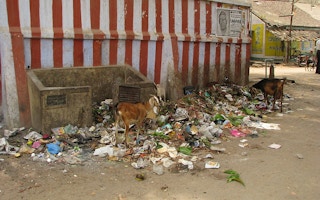In Bhopal, an Indian city with a warm, humid climate, piles of waste can be seen on almost every street corner. Every day, around 800 metric tonnes of municipal solid waste are generated there. A large portion of it ends up in the enormous Bhanpur landfill, a 40-year-old dumpsite located right in the middle of Bhopal.
“The Bhanpur dumpsite is a burning issue and it requires immediate intervention,” said Pryianka Das, Commissioner of the Bhopal Municipal Corporation.
When it rains – and during the monsoon season it rains a lot – run-off from the landfill contaminates the water supply of around two million people. Not only are the numbers of bacteria found in the water astronomic, but there are also high amounts of iron, lead, calcium and magnesium which can cause cancer and other serious health issues.
“The local government tried to intervene and launched proposals for the private sector. No companies showed interest in managing the waste because the risks were too high,” said Mark Draeck, UNIDO Industrial Development Officer.
Faced with the challenging scenario, the Bhopal Municipal Corporation partnered up with UNIDO and the Global Environment Facility (GEF) to tackle the problem. UNIDO will now assist the local authorities with relocating the waste, closing the dumpsite down in a controlled and scientific way, and managing the emissions of the methane gas produced by the decomposing garbage in the landfill.
“
The local government tried to intervene and launched proposals for the private sector. No companies showed interest in managing the waste because the risks were too high.
Mark Draeck, industrial development officer, United Nations Industrial Development Organization (UNIDO)
Entitled ‘GEF-UNIDO Sustainable Cities: Integrated Approach Pilot (SCIAP)’, the project integrates sustainability strategies into urban planning and management. Its goal is to create a favourable environment for investment in infrastructure and services, making the cities involved – Bhopal, Jaipur, Mysore and Vijayawada-Guntur - more resilient.
Apart from improving waste management, it will help Indian cities to reduce greenhouse gas emissions, promote sustainable cities practices through a partnership approach, and improve urban management practices.
Problems like this may become more common in the future
Just like Bhopal, many cities will face problems as they grow. More than half of the global population already lives in cities, but by 2030 that share will grow to two-thirds. As a consequence, the number of megacities – those with over 20 million inhabitants – is skyrocketing. We will have around 13 new megacities over the next decade, in addition to the 28 that already exist today.
There is a positive side to this. Cities are good for the economy; they produce 80 per cent of the world’s wealth. The problem is that they are also heavy contributors to climate change. Cities are responsible for 67 per cent of the global energy demand and emit 70 per cent of global greenhouse gases.
The increasing demand for energy, water and transport brought about by this population growth is putting the limits of city infrastructure to the test.
Local governments often struggle
The challenge is even greater for developing countries, since urban centres located in lower-middle-income countries in Asia and Africa are the ones with highest growth rates. With fewer funds available, they have a harder time adapting cities’ infrastructure to this new reality. These countries need to adopt new models of urban design in order to grow sustainably.
Because cities are extremely complex, most of the problems they face are interconnected. For example, energy efficiency is related to urban transportation – longer commute times often mean higher energy consumption. Cutting down average commute times involves urban planning – what can be done to get people to live closer to where they work? This is just one example of how every issue a city faces touches on a series of others.
“Cities are complex and multidimensional, we have to work together to achieve better results,” Draeck added.
This is where UNIDO can help because it is an agency specialized in building the right partnerships to create impact. UNIDO is used to bringing together other UN entities, governments, international organizations and development banks in order to achieve results.
This article was republished with permission from the United Nations Industrial Development Organization (UNIDO).










